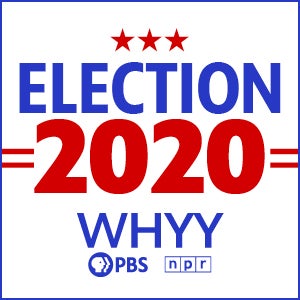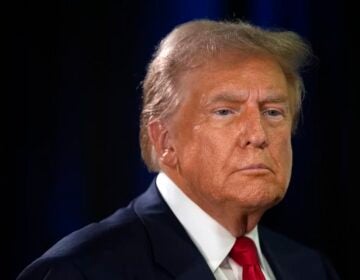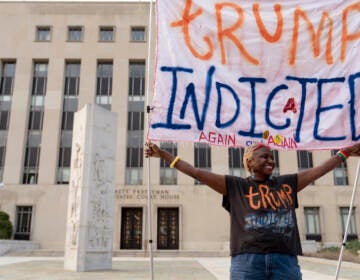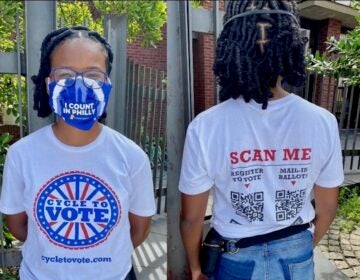Philly groups prepare to get out the vote in election year unlike any other
The pandemic leaves several questions with four months to go before the election, including what polling places will be open and the number of poll workers available.
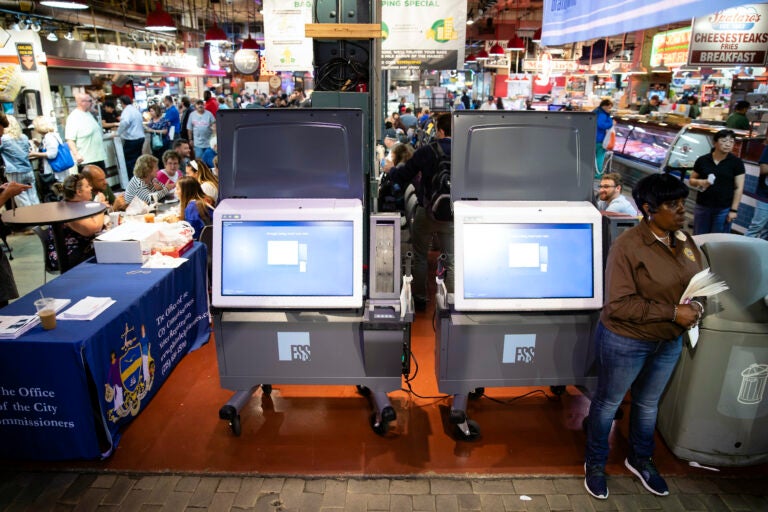
In this June 13, 2019, file photo, ExpressVote XL voting machines are displayed during a demonstration at the Reading Terminal Market in Philadelphia. (AP Photo/Matt Rourke)
This article originally appeared on The Philadelphia Tribune.
—
The general election is 100 days away and is shaping up to be unlike any prior contest in Philadelphia.
The novel coronavirus pandemic combined with widespread use of the new mail-in ballots will significantly affect how and where voters cast their ballots on Nov. 3 when the U.S. presidency and various other state and federal offices are on the ballot.
“This is an election unlike we’ve seen before,” said Robert Collier, a pastor at Galilee Baptist Church and president of the Black Clergy of Philadelphia and Vicinity.
“Don’t expect what you’ve expected in previous elections. This is different.”
The coronavirus pandemic leaves several questions unanswered with less than four months to go before the election, including how many polling places will be open and the number of available polling workers.
City election officials have said they anticipate opening as many polling locations as possible. But during the June 2 primary, upwards of 80% of the city’s approximately 830 polling stations were shuttered due to the pandemic.
City Commissioner Lisa Deeley did not immediately return a request for comment on Friday.
The U.S. presidential candidates will headline the upcoming general election, where Republican President Donald Trump is expected to compete against likely Democratic presidential nominee Joe Biden.
Down ballot, Pennsylvania Attorney General Josh Shapiro, a Democrat, is running for re-election against Republican challenger Heather Heidelbaugh. Nina Ahmad, a Democrat, will take on Republican Timothy DeFoor for auditor general.
The entire U.S. House of Representatives and all state representatives in the General Assembly are up for election, as well as state senators in odd-numbered districts, among others.
Besides the uncertainty around the effects of the pandemic on the election, many voters will use the state’s mail-in ballot system and the city’s new voting system for the first time.
The use of no-excuse mail-in ballots was put in place for the June primary due to the pandemic.
But the traditional increase in voter turnout during a presidential election means some voters have not had experience with the mail-in ballot system, creating a situation ripe for confusion, said David Thornburgh, CEO of the nonpartisan government watchdog group Committee of Seventy.
Rodney Muhammad, who heads the city’s branch of the NAACP, said the group’s voter education campaign will focus on getting registered voters to cast mail-in ballots as early as possible.
Muhammad expected recent protests around the police killing of George Floyd will result in even more people going to the polls.
“I don’t think the country and particularly Philadelphia citizens are just going to go sit back down on an important event like this,” Muhammad said.
The Black Clergy will expand its door-knocking campaign for the upcoming election to include more Philadelphia neighborhoods and surrounding counties, Collier said.
Collier said it was critical for members to focus on educating voters about the new mail-in ballot system.
The last day to register for the general election is Oct. 19. All registered Philadelphia voters who are not eligible to receive an absentee ballot are eligible to receive a mail-in ballot.
The deadline for registered voters to submit their mail-in and absentee ballot applications with the Philadelphia Board of Elections for the Nov. 3 election is 5 p.m. on Oct. 27. Postmarks will not be honored, so applications must be in the office before the deadline.
Voters must apply for a mail-in or absentee ballot for each election, unless they qualify for and request permanent status to vote by mail-in. However, voters can request to be added to the permanent mail-in ballot request list and will receive an application to renew their mail-in ballot request each year.
City officials predict half the estimated ballots cast in the election will be via mail-in ballots (350,000). Election officials have already received more than 140,000 mail-in ballot applications.
In the June primary, 348,740 voters (32% of registered voters) cast ballots, of which 140,393 were mail-in ballots and 34,783 were absentee ballots
For those who vote in person, some will cast their ballots on the city’s new voting machine system, which was put in place last year.
With the election fast approaching, Thornburgh said the Committee of Seventy is focusing on voter outreach and education with its WeVote campaign, stressing, “This is a time to focus on the mechanics, the nuts and bolts and the information and awareness — it’s a huge list.”
“If voters are confused … then the rest sort of doesn’t matter because when voters are confused or anxious, they don’t vote,” Thornburgh said.
Collier said that for Black and brown communities, the November election is crucial as the city confronts the fallout from the Floyd killing, a rise in racism, debate over public statues, and looting following some demonstrations.
“We need an administration that recognizes the need to provide jobs, to provide economic parity, to allow us to compete on a level playing field,” Collier said, adding, “We haven’t seen that yet.”

Get daily updates from WHYY News!
WHYY is your source for fact-based, in-depth journalism and information. As a nonprofit organization, we rely on financial support from readers like you. Please give today.


